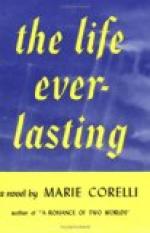yet undeclared,—like a snow-white cloud
with the sun behind it. But I was given no solution
of the rapturous mystery surrounding me,—and—granting
my soul an absolute freedom, it could plunge no deeper
than through the immensity of stars to immensities
still more profound, there to dream and hope and wait.
For years I had done this,—for years I had
worked and prayed, watching the pageant of poor human
pride and vanity drift past me like shadows on the
shore of a dead sea,— succeeding little
by little in threading my way through the closest
labyrinths of life, and finding out the beautiful reasons
of living;—and every now and then,—as
to-night,—I had felt myself on the verge
of a discovery which in its divine simplicity should
make all problems clear and all difficulties easy,
when I had been gently but firmly held back by a force
invisible, and warned, ’Thus far, and no farther!’
To oppose this force or make any personal effort to
rebel against it, is no part of my faith,—therefore
at such moments I had always yielded instantly and
obediently as I yielded now. I was not allowed
to fathom the occult source of my happiness, but the
happiness remained,—and when I retired to
rest it was with more than ordinary gratitude that
I said my usual brief prayer:—For the day
that is past, I thank Thee, O God my Father! For
the night that has come, I thank Thee! As one
with Thee and with Nature I gratefully take the rest
Thou hast lovingly ordained. Whether I sleep
or wake my body and soul are Thine. Do with them
as Thou wilt, for Thy command is my joy. Amen.
I slept as soundly and peacefully as a child, and
the next day started on my journey in the brightest
of bright summer weather. A friend travelled
with me—one of those amiable women to whom
life is always pleasant because of the pleasantness
in their own natures; she had taken a house for the
season in Inverness-shire, and I had arranged to join
her there when my trip with the Harlands was over,
or rather, I should say, when they had grown weary
of me and I of them. The latter chance was, thought
my friend, whom I will call Francesca, most likely.
“There’s no greater boredom,”—she
declared—“than the society of an
imaginative invalid. Such company will not be
restful to you,—it will tire you out.
Morton Harland himself may be really ill, as he says—I
shouldn’t wonder if he is, for he looks it!—but
his daughter has nothing whatever the matter with
her,—except nerves.”
“Nerves are bad enough,”—I
said.
“Nerves can be conquered,”—she
answered, with a bright smile of wholesome conviction—“Nerves
are generally—well!—just selfishness!”




